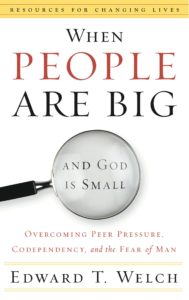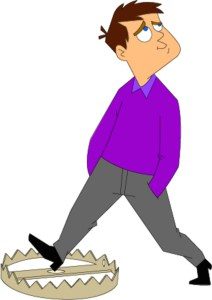“The fear of man brings a snare, But whoever trusts in the LORD shall be safe” (Prov. 29:25)
What I want us to do is to take this in two halves. First, we are going to understand the meaning of man-pleasing from God’s point of view, and second, we are going to study the cure, the obedient response that God calls for.
Let me summarise the first part of this verse:
I. Fear of Man Is a Self-Imposed Trap
The fear of man brings a snare. A snare is a trap, a device used to catch animals. Obviously, a trap is hidden, and disguised, because it is intended to catch an animal that doesn’t want to be caught. But once caught, the animal cannot get out, and has lost its freedom. Scripture tells us that man-pleasing is the same. Like a trap, we find ourselves in a kind of bondage. We have lost some freedom, because now what we do or don’t do is handcuffed to other people. The fear of man means your life is now constricted, you are bound, limited, perhaps even paralysed because of the fear of man. Ed Welch, in his excellent book “When People Are Big and God is Small” summarises the fear of man as being one or more of three fears: First, you can fear that people will find out what you are really like or what you have done and expose you. Second, because of something you do or are or have or say or wear, people will reject you and despise you. The third is that people will in some way or another attack us and harm us, verbally, physically. Humiliation, heckling, and harm. Shamed, shunned, and shattered.
And like every sin, there is something originally good that is twisted and perverted by pride into something evil. For example, there is a healthy sense of shame for what is wrong. The old King James talks about the virtue of shamefacedness, which meant a sense of modesty and propriety. If someone has lost the ability to blush at her own exposed nakedness, we do not admire her lack of fear of man, we say she has lost all shame. It is a good thing to not want to be exposed, to not want your sins and failing paraded. It is a good thing to want our sins covered – the question really is how and by whom.
It is also not wrong to desire the company and fellowship of people. We should want the society and friendship of godly people. There is a sense in which we should fear losing the respect and company of the right kind of people. If this weren’t true, then  what good would church discipline ever do? The point of the process is that there is a sting to being excluded, there is a painful shame that is meant to goad a person to repentance. This is a good kind of fear of man. And it is definitely not wrong to want to avoid threats to life and limb. We should want to avoid the dangers of violent crime, of loss, of injury. This is an otherwise healthy love of life. The original good – desiring to have a good name and not a ruined one, the desire to have fellowship with godly people, and the desire to be free of danger to life are not evil desires. But the nature of sin is to take a lawful love and turn it into an unlawful one. It takes a good thing, and by inflating its importance, turns it into a bad thing.
what good would church discipline ever do? The point of the process is that there is a sting to being excluded, there is a painful shame that is meant to goad a person to repentance. This is a good kind of fear of man. And it is definitely not wrong to want to avoid threats to life and limb. We should want to avoid the dangers of violent crime, of loss, of injury. This is an otherwise healthy love of life. The original good – desiring to have a good name and not a ruined one, the desire to have fellowship with godly people, and the desire to be free of danger to life are not evil desires. But the nature of sin is to take a lawful love and turn it into an unlawful one. It takes a good thing, and by inflating its importance, turns it into a bad thing.
And that brings us back to our summary of the first half of Proverbs 29:15: – man-pleasing is a selfimposed trap. Proverbs is not giving us this information as if we are helpless victims of the fear of man; it is meant to tell us to avoid this trap. And if we can avoid it, then we are the ones who lay it for ourselves.
It sounds contradictory – a self-imposed trap. Who tries to trap himself? Well, that’s the conflicted nature of fallen human beings. James tells us that we are capable of deceiving ourselves. That is, we tell ourselves lies until we believe them. We can suppress some truths. So in this sin, we can focus on what seems reasonable – not wanting to be humiliated not wanting to be rejected, not wanting to be harmed, but we ignore how much we want those things, we ignore what a priority we have made
those things, we fail to see how tightly we are clinging to these things. So here is the secret that Proverbs is teaching us, the fear of man is really an idolatrous love of self. I do not fear man sinfully because of my deep love for my neighbour. I fear man because of what he or she may do to me, what my neighbour may withhold from me. The sinful fear of man is not driven by a desire to love others. When trapped by the fear of man, it is because in those moments I am at the centre of my own orbit, and the gravitational pull that others have on me is because it has become so important to me that they orbit me as I want them to.
What Proverbs wants you to know is that you trap yourself when you treasure other’s opinions of you more than that of God’s,  because you have placed yourself at the centre. The first issue is not how important others have become to you; it is how important you have become to you. To cave in to social pressure is not because you love yourself too little and need others to affirm you, it’s because you love yourself so much and want others to affirm you. You have to see that excessive
because you have placed yourself at the centre. The first issue is not how important others have become to you; it is how important you have become to you. To cave in to social pressure is not because you love yourself too little and need others to affirm you, it’s because you love yourself so much and want others to affirm you. You have to see that excessive
competitiveness is wanting to be seen as better than others, so that you would be admired. We must see our envy as a sign of desiring the praise of man for better things. We must see our excessive desire to please others by never saying no, by taking unnecessary responsibility for other’s lives, is a desire to please ourselves by using others. We want to be known as a saviour, as a wonderfully kind and merciful person. We must see our inability to say no, to withdraw for fear of hurting others is not so much a love for others as it is a love of ourselves, not wanting to appear or be known as someone who hurts others.
In other words, the fear of man is a really the love of self using man. But once we allow this selfishness to grow, soon we grant to others a place in our lives they should not have, and before long we are in fear of them. We are trapped, because now we have inflated people, and demoted God, but the root cause seems invisible to us – which is a profound selfishness. Now in a very real sense, that’s good news. Because I cannot change other people. I cannot control whether someone will humiliate me, expose me, shun me, withhold approval, slander me or harm me physically. But I can change how important that is in my own eyes. I can change whether the ultimate love in my life is self or not.
 – David De Bruyn, Professor of Church History, Shepherds’ Seminary Africa
– David De Bruyn, Professor of Church History, Shepherds’ Seminary Africa

